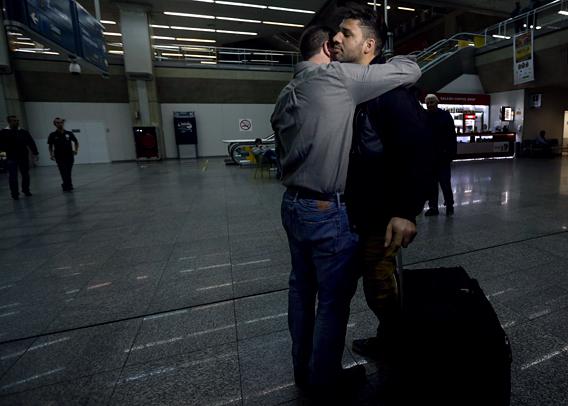There’s quite a bit of bafflement and justifiable outrage out there on Monday over how exactly David Miranda, the Brazilian partner of Guardian journalist Glenn Greenwald, could be detained for nine hours at Heathrow Airport under British terrorism laws. While it’s clear that Miranda was clearly aiding Greenwald’s work—he was delivering documents on encrypted thumb drives to fellow journalist Laura Poitras and the Guardian was paying for his flight—it’s laughable to suggest that such activities are in any way tantamount to aiding terrorism.
It’s not the first time that the law in question—Schedule 7 of the Terrorism Act—has provoked controversy. The law gives examining officers in British border areas authority to “search the person” or “anything which he has with him, or which belongs to him” of a traveler to determine if he is “concerned in the commission, preparation or instigation of acts of terrorism.” The law gives authorities the right to hold the person involved for up to nine hours—which they appear to have taken maximum advantage of in Miranda’s case.
According to an independent review of the law presented to parliament last June, “Schedule 7 examination power was used on 61,145 persons in 2012/13,” which was actually a 12 percent decrease from the previous year and a 30 percent decrease the year before that. Most of those examinations lasted less than 15 minutes, and in the 2011–12 period only 24 people were arrested as a result of these stops.
While the review found “no evidence that persons of Asian appearance are more likely to be examined,” British Muslims have frequently alleged that they are profiled under the law. One activist explained his objections to Al-Jazeera two months ago:
“For many Muslims it’s not so much that they have been stopped but the type of questioning that accompanies that,” Asim Qureshi, CagePrisoners’ research director, told Al Jazeera. “For example, they get asked, ‘What type of Muslim are you? What are your foreign policy opinions? What are your views on Palestine?’”
“None of those questions pertain to whether that person poses a credible risk to UK security. It’s a fishing exercise that’s not got anything to do with any immediate security concerns. Of course this creates resentment.”
Of course, Miranda’s experience raises other issues entirely. Unless British authorities have suddenly developed concerns over the security threat posed by a 28-year-old gay Brazilian, Miranda wasn’t demographically profiled. The fact that he was held for the full nine hours rather than the 15-or-so minutes that it usually takes to process travelers under the law certainly seems hard to explain as anything other than an effort to intimidate Greenwald. (Poitras frequently faces such stops when traveling internationally, according to Sunday’s New York Times Magazine profile.) The British government has already announced some proposed changes to the law, including reducing the maximum examination period from nine hours to six hours and giving detainees the right to legal counsel during their questioning. Hopefully, after Miranda’s experience, these reforms will also include the British government giving a detailed explanation of what it actually considers to be terrorism.
